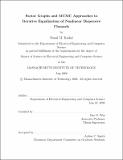Factor graphs and MCMC approaches to iterative equalization of nonlinear dispersive channels
Author(s)
Kashif, Faisal M. (Faisal Mahmood)
DownloadFull printable version (661.7Kb)
Alternative title
Factor graphs and Markov chain Monte Carlo approaches to iterative equalization of nonlinear dispersive channels
Other Contributors
Massachusetts Institute of Technology. Dept. of Electrical Engineering and Computer Science.
Advisor
Moe Z. Win.
Terms of use
Metadata
Show full item recordAbstract
In this work, equalization for nonlinear dispersive channels is considered. Nonlinear communication channels can lead to significant degradations when nonlinearities are not taken into account at either the receiver or the transmitter. In many cases, the nonlinearity of the channel precludes the use of spectrally efficient signaling schemes to achieve high data-rates and the bandwidth efficiency. Satellite channel is a typical case of nonlinear channel that needs to be used efficiently. We develop two novel equalization strategies for a general class of nonlinear channels. Both strategies are based on iterating between decoding and equalization, termed as iterative equalization. The first strategy is a factor graph based equalizer that converts the nonlinear channel equalization problem into forward-backward algorithm on hidden Markov model (HMM). The equalizer is implemented via the sum-product algorithm on the factor graph representation of the channel and receiver blocks. The second equalization strategy is based on Markov chain Monte Carlo (MCMC) methods. We typecast the problem of executing forward-backward algorithm on HMM into an MCMC domain problem and develop four different types of MCMC equalizers. (cont.) These solutions have different performance and magnitudes of complexity. For the purpose of performance analysis of our equalizers, simulation results were obtained for two different scenarios: Quadrature Phase Shift Keying (QPSK) and 16-Quadrature Amplitude Modulation (QAM). Significant performance gain compared to the linear equalizer is reported for both factor graph and MCMC strategies. We also present a detailed performance and complexity analysis of the equalizers. Both equalization strategies require knowledge of the channel. In many practical situations, the channel has to be estimated. To this end, we consider two scenarios: first, when the channel model/structure is known and second, when there is no information regarding the channel structure. In the first case, we derive a maximum-likelihood (ML) channel estimator for a Volterra structure based nonlinear channel and evaluate the estimator's performance bounds. We also explore the optimal pilot design and present simulation results. In the second scenario, when no model for the channel is available, we propose use of the de Bruijn sequence as the pilot to perform the ML estimation of the channel function. (cont.) While developing MCMC iterative equalization, we set up the problem such that MCMC technique efficiently solves the inference for an HMM based system with reduced computational cost. In general, inference on an HMM based system has a complexity that is exponential in the size of the state-space of the system, however our MCMC based solution has a linear complexity. This aspect of our strategy can be generalized to other engineering applications involving HMM structure.
Description
Thesis (S.M.)--Massachusetts Institute of Technology, Dept. of Electrical Engineering and Computer Science, 2006. Includes bibliographical references (p. 83-90).
Date issued
2006Department
Massachusetts Institute of Technology. Department of Electrical Engineering and Computer SciencePublisher
Massachusetts Institute of Technology
Keywords
Electrical Engineering and Computer Science.